Green tea is one of the most powerful natural fat-burners, and on top of that, it has an incredible variety of health benefits. Its antioxidants help improve risk factors for heart disease, and it may even be able to help sustain cognitive function into old age.
The genesis of green tea extract as a supplement comes from studies on regular drinkers of green tea, which have found remarkable health benefits. If you don’t want to gulp down half a dozen cups of tea every day, green tea extract is a fantastic alternative.
Looking for the best green tea extract supplements around? Our research team has done a thorough review of your options and has ranked the best supplements on the market.
Research
Rankings
1. BulkSupplements Green Tea Extract
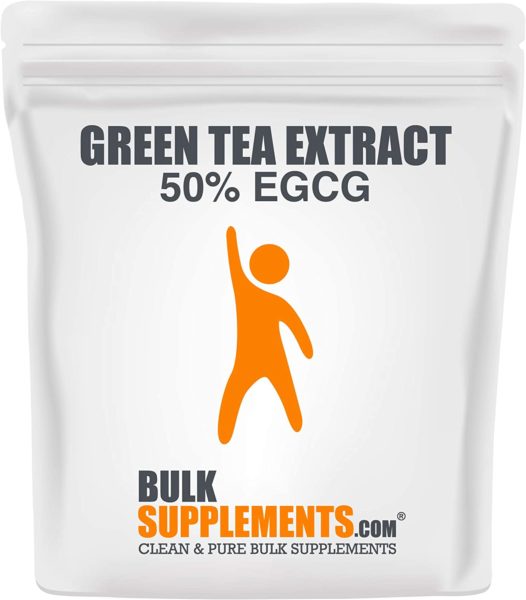
The name BulkSupplements is synonymous with pure, inexpensive, and high-quality supplements packaged in loose powder form.
This is exactly the case with its green tea extract offering. It comes in a sealable foil bag containing the loose powdered extract, leaving the measuring up to you.
The green tea extract is standardized to contain at least 50% polyphenols. Serving size is a bit arbitrary with a loose powder, but per 400 milligrams, Bulk Supplements Green Tea Extract contains 270 mg of EGCG and 1 mg of caffeine.
The super-pure formulation, plus the fact that it’s available in both powder form and capsule form makes it our top pick overall.
2. NusaPure Green Tea Extract
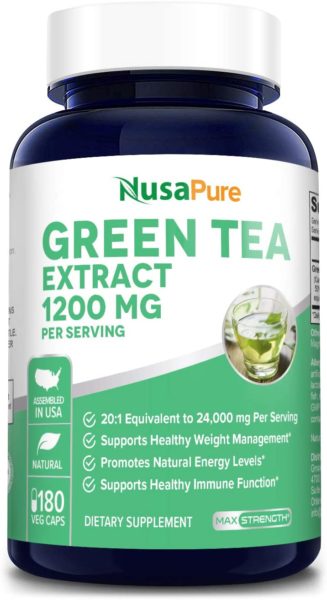
NusaPure Green Tea Extract is a capsule-based green tea supplement that delivers a potent dose of 500 mg of green tea per capsule, with at least 45% of that being pure EGCG.
The caffeine content is about what you’d get in a normal cup of green tea: no more than 25 mg per capsule. This high dose supplement is a great way to take full advantage of the wide range of health benefits of green tea extract.
3. Zhou Green Tea Extract
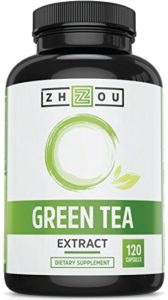
Zhou Green Tea Extract is definitely well-known, and for good reason: it provides a straightforward green tea extract supplement without any extraneous ingredients.
Because green tea itself contains caffeine, Zhou green tea extract contains caffeine too. Each capsule contains no more than 15 milligrams—this is about one-sixth or one-seventh the caffeine contents in a cup of coffee.
For most people, you’ll be able to take this supplement at any time without having “caffeine jitters,” but if you’re especially caffeine sensitive, you might want to avoid taking it within a few hours of going to bed.
4. Zenwise Green Tea Extract
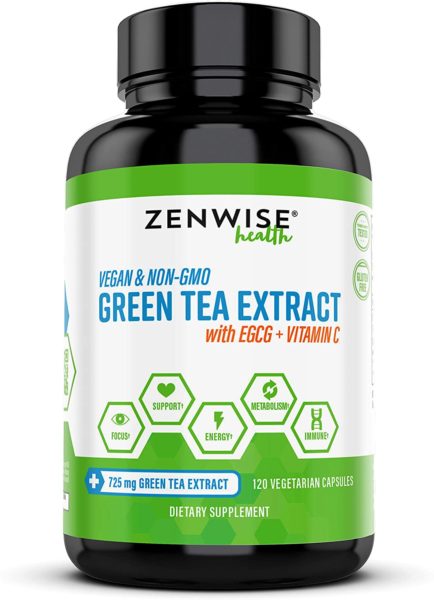
Though it’s a ubiquitous brand that you can find at drug stores and big-box retailers, Zenwise usually puts out solid supplement options.
Its green tea extract comes in a vegetarian capsule made of plant cellulose that delivers a 750 mg dose of green tea extract along with 60mg of Vitamin C. The extract is standardized such that 98% of it is polyphenols, and 50% is EGCG.
As we’ve come to expect, Zenwise delivers with its green tea extract offering. It’s a very good choice if you are looking for a health-promoting green tea supplement that delivers a solid dosage of polyphenols.
5. Life Extension Mega Green Tea Extract
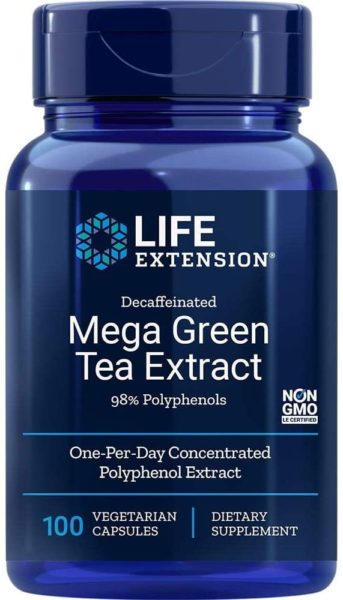
As you might guess from its name, Life Extension Mega Green Tea Extract is focused purely on the health benefits of green tea.
Its vegetable cellulose capsules provide 725 mg of green tea extract each, standardized to 98% polyphenols and 45% EGCG by weight. Because the focus is overall health benefits and not weight loss, the capsules are decaffeinated; each capsule contains barely 2 mg of caffeine.
Outside of the green tea content, the ingredients in the capsules are nothing remarkable. Your standard fare for filling up capsules (rice flour, magnesium stearate, silica) are present, but nothing outside of this.
6. Nature’s Wellness Green Tea Extract
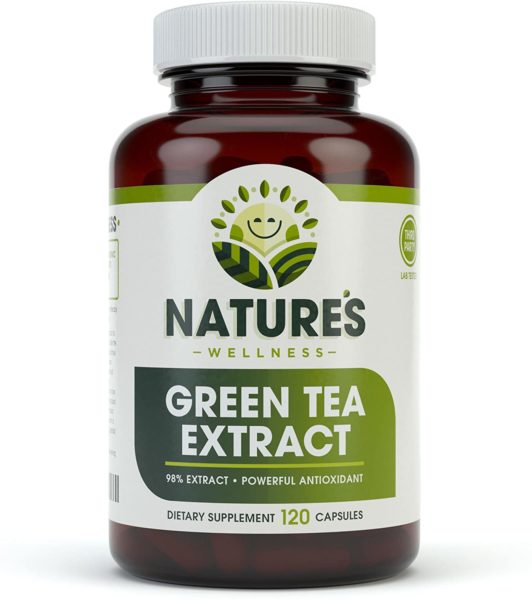
The green tea extract supplement offered by Nature’s Wellness delivers 500 mg of green tea extract, of which 98% is polyphenols, 75% is catechins, and 45% is EGCG. These numbers are better than many competitors, but not the absolute best.
Its caffeine content is on the high end of what you’d expect in a green tea extract supplement. The caffeine content is actually good news if you are looking to lose weight.
There may be a synergistic reaction between the polyphenols in green tea extract and the well-known metabolism boosting properties of caffeine; these wouldn’t occur in a supplement that had very little caffeine.
7. Now Foods Green Tea Extract
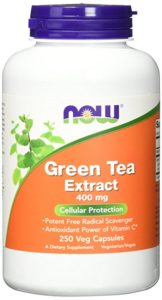
Now Foods is a perennial supplement manufacturer with an up and down record. Sometimes, their products are fantastic, and other times, their products are more lackluster.
Each vegetarian capsule (made with vegetable cellulose) contains 400 mg of green tea extract, and up to 32 mg of caffeine. This makes taking a capsule on par with drinking a real cup of green tea.
Independent lab testing determined that the EGCG content of the supplement—a marker for how concentrated the polyphenols in the supplement are—was on the lower end. Each 400 mg capsule provided 144 mg of ECGC, or about 36%.
8. PureTea Green Tea Extract
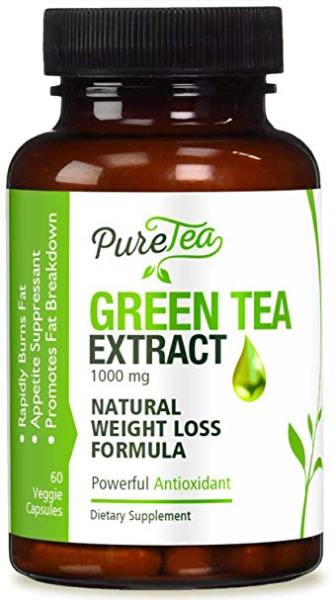
PureTea is a fairly standard green tea extract without any surprising or out-of-the-ordinary properties.
It provides the kind of dosage you’d expect: 500 mg of green tea extract, 98% of which is polyphenols, 75% catechins, and 45% EGCG.
In terms of other ingredients, there’s very little out of the ordinary. The capsule is made from cellulose, so it’s vegetarian friendly.
9. Primaforce Lean Green
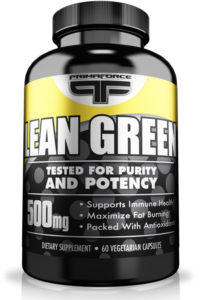
Despite its name (gearing its marketing towards people whose goal is to burn fat), Primaforce Lean Green is a decaffeinated green tea extract.
It delivers 500 mg of green tea extract per capsule, a pretty standard amount. Of this 500 mg, 98% is polyphenols, 60% is EGCG, and 40% is catechins.
These numbers are pretty good, especially considering that it’s a straightforward supplement, but because of other ingredients like magnesium stearate and silicon dioxide, it does not find itself at the top of the rankings.
10. Jarrow Formulas Green Tea
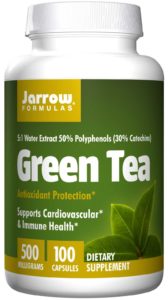
The green tea extract made by Jarrow Formulas comes in a 500 mg tablet as opposed to the more standard gelatin or vegetarian cellulose capsules.
It delivers 500 mg of green tea extract, but only 50% of this is polyphenols, 30% catechins, and 15% EGCG. This may be the result of the extraction process, which is water-based.
Because of the low concentration of polyphenols, catechins, and EGCG, it’s hard to rank Jarrow Formulas’ supplement very highly, especially when there are so many other good options on the market.
Category winners
Best green tea extract overall: BulkSupplements Green Tea Extract
BulkSupplements comes out on top thanks to its ultra-pure formulation and the fact that it is available in both capsules or raw powder. For ease of use, capsules are great, but if you want to customize dosing, or if you want to incorporate green tea extract into a meal replacement shake or green drink, powder is the way to go.
Best green tea extract for heart health: NusaPure Green Tea Extract
NusaPure makes it straightforward to harness the heart health-promoting effects of green tea extract thanks to their simple and high-dose capsules. With a minimum of extra ingredients, it’s hard to find a better option for a healthy heart.
Best green tea extract for weight loss: BulkSupplements Green Tea Extract
Green tea extract is one of the most robust supplements for dropping excess weight, and BulkSupplements serves up the top supplement on the market for this purpose. While their ultra-pure powder is the best option if purity is important to you, BulkSupplements also offers capsules for maximum ease of use.
Best green tea extract for cognitive health: Zhou Green Tea Extract
Zhou Green Tea Extract is a little lower in EGCG dosage, but its purity is fantastic and the capsules are much easier to take than raw powder. If you’re looking for an easy addition to your supplementation routine to help sustain cognitive function, look no further.
Best green tea extract for inflammation: NusaPure Green Tea Extract
To cut down on inflammation, go for the high-dose formulation of NusaPure. At 600 mg of green tea extract per capsule, there’s no better or easier option for tackling systemic inflammation in your body with green tea’s antioxidants.
Best green tea extract for burning fat: Bulk Supplements Green Tea Extract
BulkSupplements makes it easy to leverage the fat-burning powers of EGCG. Opt for the vegan-friendly capsules for a fast, simple way to accelerate fat oxidation.
Who should buy green tea extract?
Green tea extract is useful on three independent fronts: it is a great natural weight loss supplement, it boosts your cognitive performance, and it improves long-term health.
It is perhaps best known for its weight loss benefits, thanks to its heavily studied potential to act as both a thermogenic and as an appetite suppressant. When it comes to supplements with a proven track record for weight loss benefits, green tea extract stands at the top of the heap.
But don’t make the mistake of thinking that green tea extract is only for people looking to lose weight. It’s a powerful nootropic, meaning it can boost your brain function in specific cognitive tasks.
Thanks to these benefits, green tea extract has been studied as a way to slow or delay cognitive decline in older adults. Finally, green tea extract is a potent antioxidant, and is thought to reduce your risk for several long-term health problems like cancer and heart disease.
Thanks to the huge amount of scientific research behind its benefits and the wide variety of domains of health that green tea extract acts in, it’s one of the best all-around supplements on the market.
It should be no surprise that it places highly on rankings like the best natural weight loss supplements and the best supplements for men.
How we ranked
With all of the scientific research behind green tea, our research team had a wealth of data to use to analyze the expected efficacy of the range of green tea extract brands that are currently on the market.
To formulate our rankings, we first gathered all of the green tea extract products on the market, considering only those whose only active ingredient is green tea extract.
While you’ll find green tea as a prominent ingredient in many weight loss pills and antioxidant supplements, we wanted to stick to products that were as close as possible to what’s been tested in the scientific and medical literature. That meant restricting our list to only products that had no other active ingredients.
Next up, we examined the dosage: different applications seem to require different doses of green tea extract, and research has explored doses as small as 80 mg to as much as 3000 mg per day of green tea extract.
We focused on supplements that provided green tea extract in a dose that is within the most commonly studied range of 250 to 750 mg of green tea extract per day—or supplements that made it easy to hit this dosage.
We focused on the concentration of the actual active ingredient in green tea extract, which is EGCG, or epigallocatechin gallate. Two supplements could have the same green tea extract dose but different EGCG doses, so we prioritized the EGCG dose over the total green tea content.
We found that, for many people, powder-based green tea extract supplements provided better results than capsule based supplements because of the flexibility of dosing.
If you are taking green tea extract to decrease your cholesterol levels, you may want a different dose than if you were taking green tea extract to lose weight, for example.
While powder-form green tea extract usually requires a scale to weigh out, this inconvenience is often worth it, as you can mix powder form green tea extract into a meal replacement shake or protein shake. However, we included plenty of capsule-based supplements in our final rankings as well if you want to avoid the mess of a powder form supplements.
Finally, we considered purity and clean supplement design: we ditched any products that had too many binders and fillers. Again, powder form green tea extract had a strong advantage here, as the best products had zero additional ingredients. For capsule based supplements, we had a slight preference for cellulose based capsules because they are vegan-friendly, but there are plenty of quality gelatin based supplements that still made our list.
Our rankings represent the best green tea extracts on the market right now, and are great options if you are looking to lose weight, boost your mental performance, or improve your long-term health.
Benefits
Green tea catechins are responsible for a wide range of health benefits. These compounds are super-strength antioxidants that have incredibly powerful and healthful effects on cellular activity.
When a nutrient acts on the human body at the cellular level, it can act as the springboard for endless positive effects on health. Catechins have been shown to be more powerful than vitamin C and E when it comes to reducing oxidative damage to cells (1).
Catechins may also fight disease in other ways as well, but more research is needed.
Researchers at Harvard Medical School have concluded that green tea’s antioxidants improve health in at least 7 proven ways, with the potential for numerous more.
Green tea could reduce the risk for certain types of cancer. Scientists have shown over an over an association between drinking green tea and lowered risk of a handful of cancers. These include: colon, bladder, esophageal (2), breast (3), ovarian (4), pancreatic (5), stomach (6) (7) and prostate (8)
More research is needed to move from “association” to “cause”, but clinical studies suggest it may be the polyphenols that help prevent cancer. These compounds may also even kill cancer cells.
One study of almost 500 women who had breast cancer showed that the women who consumed the largest quantities of green tea had the least spread of cancer. Plus, women in early stages of the disease were less likely to have the cancer come back when done with their treatment (9).
Studies like this one have been performed for every type of cancer listed above, each with positive conclusions about drinking green tea.
Green tea extract can low cholesterol. The proof has come in many times over: green tea lowers LDL cholesterol (the “bad” type). And it doesn’t just lower the LDL a little bit. Studies have shown that drinking green tea produces fantastically wonderful results in terms of lowering bad cholesterol (10).
The implications for prevention and treatment of heart disease are dizzying for the medical community.
Green tea extract can boost brain power. This is probably the newest discovery about green tea benefits: it improves brain function.
With a special emphasis on improving what researchers call “working memory”, green tea may someday be used to treat dementia (11). Given this data, we soon be seeing green tea appearing in smart drugs as well!
Green tea extract lowers blood pressure and increases bloodflow to the brain
This benefit is truly exciting for doctors and patients with heart disease: drinking green tea may lower the risk of high blood pressure by as much as 50%. As little as half a cup per day may do the trick (12).
To reap this benefit, you’ll have to drink green tea every day for at least a year before you see much effect on blood pressure, according to researchers.
This is perhaps the main reason drinking green tea is such a heart-healthy activity. In healthy patients, green tea may reduce cardiovascular risk by improving blood flow in the brachial artery (13).
What’s more, it has to be green tea not black tea, not caffeine.
Green tea can stabilize blood sugar. Anyone with diabetes knows that keeping your blood sugar levels stable is essential to health. Even those without diabetes can benefit from the effects on blood sugar levels that green tea can impart.
It may even lower blood sugar, according some scientists. Again, it’s the catechins that do the magic. They have been shown in clinical studies to lower the postprandial blood glucose in human subjects (14).
Green tea extract is an excellent weight loss supplement. Until recently, doctors cited green tea as a weight loss aid only because it made a great substitute for drinking sugary soda. But now, evidence is appearing that green tea may actually take a more proactive role when it comes to helping you drop pounds.
A Penn State study (12) put some fat mice on a 16-week diet of green tea and exercise. They found that inclusion of green tea in the diet reduced body mass by 27.1%. The mice also lost abdominal fat at a rate of 36.6%.
The green tea also produced significant diabetic health benefits as well.
For weight loss, the most important of these catechins is epigallocatechin gallate (EGCG), which revs up metabolism. Let’s take a look at how that works.
Stored fat must be discharged from cells and enter the blood stream before it can be burned for fuel. Green tea’s active compounds enhance the effect of hormones required for releasing fat from cells.
The hormone norepinephrine acts like a messenger, carrying signals from the central nervous system to fat cells, instructing them to break down fat so it can be released.
Epigallocatechin gallate, the star player in green tea’s catechin cast, is especially proficient at inhibiting the enzyme that breaks down norepinephrine. This is important because when EGCG slows this process down, the body ends up with a greater concentration of norepinephrine in circulation. (7)
When there’s more norepinephrine cruising through the system, more messages to break down stored fat and set it free are delivered to the cells. The end result is more fat can be accessed for energetic requirements. (8)
Caffeine also appears to interact with EGCG synergistically in the process of liberating stored fat from cells, utilizing the same hormonal pathway traveled by signals sent from the central nervous system. (9)
The body can draw from energy in stored fat to meet fuel needs during periods of strenuous exertion, like when you’re pedaling up a big hill, or covering the second half of your jogging route.
Green tea helps you burn even more fat during intense exercise. Male subjects who took green tea extract burned up to 17% more fat during exercise periods than those who didn’t. (10)
Energy demands are constant, and cellular functions require fuel whether you’re sitting, lying on the couch, or sleeping. The thermogenic properties of green tea can actually extend around the clock, affecting metabolism even when you’re not active.
Conclusions from most studies indicate green tea extract increases energy consumption at rates between 3% and 4%, while others measured up to 8%. (11, 12, 13) Obviously the effects differ between individuals, but even with the lower percentages, someone eating about 2000 calories a day would burn 60 to 80 more calories over 24 hours. (14)
Several studies support the evidence that EGCG in green tea enhances the body’s capacity to burn more fat at rest. This can have a significant effect on achieving lower body fat percentages and maintaining the changes over time. (15, 16, 17)
A clinical trial with 60 obese participants showed promising results for weight loss over a three-month period. Not only did the subjects drop an average of just over 7 pounds, but energy expenditures rose during the trial. At the finish line, participants were burning an average of 183 more calories daily than when they began. (18)
While animal studies indicate the compounds in green tea may inhibit fat absorption during digestion (19, 20), this effect has not yet been proven with humans.
The fat loss experienced by most subjects participating in the studies mentioned above was not dramatic, sometimes only amounting to 3 or 4 pounds. (22, 23)
However, it’s important to remember not all fat has the same effect on health, and significant percentages of the fat reduction noted in studies involving green tea extract came from abdominal deposits. (24, 25)
This visceral fat stored around organs and tucked away in the midsection is the most dangerous type.
Negatively affecting insulin resistance and triggering inflammation, deep fat is linked to higher risk factors for metabolic disorders, including type 2 diabetes. (26)
The chances of suffering a heart attack go up when you carry excess abdominal fat (27), and inflammation is associated with a staggering list of disorders ranging from gastrointestinal diseases to arthritis.
Women with generous stores of visceral fat are more likely to need gallbladder surgery, as well as be diagnosed with breast cancer. (28)
Side effects
Green tea extract is quite safe, especially compared to some other weight loss supplements that have been on the market. A 2008 article in the journal Drug Safety evaluated adverse effects reports in a series of databases across the world (28).
The authors of the study concluded that green tea extract is broadly safe, though there have been a very small number of reports of liver toxicity that could be attributed to green tea extract.
Analyzing these rare case reports of liver toxicity, the authors recommended that green tea extract not be taken on an empty stomach, though they cautioned that these recommendations were based only on a small number of case studies.
It’s also not clear whether merely drinking green tea (which billions of people do on a regular basis) would also cause liver damage in rare cases, and if not, what the mechanistic explanation for the difference might be.
Recommended dosage
Though it has been heavily studied, there does not seem to be one specific dosage of green tea extract that works for every condition and every situation. A huge range of dosages have been explored in the scientific literature, but when examining studies that pool the results of many other experiments, some trends do emerge.
The optimal dose of green tea depends on the specific application. One study published in the Journal of Nutritional Biochemistry recommends a daily dose of 270 to 1200 mg of green tea extract per day for optimal results when it comes to losing weight and countering the negative health effects of obesity (29).
When it comes to controlling blood glucose and battling metabolic syndrome, another review study recommends daily dosages of about 80 to 380 mg of pure EGCG (30).
Finally, for reducing LDL (“bad”) and total cholesterol, a meta-analysis reports that doses as low as 145 mg per day and as high as 3000 mg per day of green tea extract have cholesterol-lowering effects (31).
For boosting brain function, the optimal dose is not quite as clear, but a 2017 review article in the journal Phytomedicine cites studies that found cognitive benefits from doses of 200 to 600 mg of green tea extract per day (32).
Since it does have some caffeine (unless you get a decaffeinated version), green tea extract is best taken in the morning. Per the research cited in the discussion of the potential side effects of green tea extract, it also seems wise to take green tea extract alongside food, as opposed to on an empty stomach.
FAQ
Q: What does green tea extract do?
A: Green tea extract contains powerful antioxidants, which help battle against systemic inflammation in your body.
These antioxidant related effects are thought to be why green tea extract is so good at reducing markers for chronic diseases such as heart disease and metabolic syndrome.
On top of this antioxidant effect, green tea also upregulates your body’s fat oxidation, particularly in your liver, and simultaneously inhibits your appetite as well. These effects are why green tea extract is so popular as a weight loss supplement.
Q: Does green tea extract help you lose weight?
A: Green tea extract helps with weight loss on two fronts. First, it acts as a thermogenic by upregulating your body’s rate of fat oxidation.
In other words, your baseline metabolic rate (and thus your caloric expenditure) goes up, and the reason for this increase is that your body is burning more fat. Green tea extract also acts as an appetite suppressant, which makes you less inclined to overeat at meals.
Thanks to its ability to decrease your energy intake as well as increase your energy expenditure, green tea extract is one of the top natural weight loss supplements out there.
Q: How much green tea extract is too much?
A: While scientific research has explored a huge range of green tea extract dosages (up to 3000 mg per day!), most recommendations of dosage come with an upper limit around 1200 mg of green tea extract per day.
More importantly, it does not appear to be necessary to take high doses to get the benefits of green tea extract. Doses as low as 200 mg have been found to exert positive benefits on cognitive function and mood, and even daily dosages of as little as 145 mg can reduce your cholesterol levels.
Taking a middle of the road dosage of 200 to 600 mg of green tea extract appears to be the best plan for optimal results.
Q: Does green tea extract have caffeine?
A: Since the raw tea leaves that green tea extract is derived from have caffeine, green tea extract also has caffeine. However, the absolute caffeine content is pretty low, and some products are even processed to remove the caffeine.
For example, in the green tea extract supplements on our rankings, all had caffeine contents of 25 mg or less per capsule, even for fairly high doses of green tea extracts. Some green tea products are specifically decaffeinated so they contain 1 mg or less of caffeine per capsule.
These products are a good choice if you are especially sensitive to caffeine, though if you are taking green tea for cognitive benefits or for weight loss, you may want to opt for a supplement that includes some caffeine.
That’s because green tea’s active EGCG compounds seem to work synergistically with caffeine, helping to amplify the cognitive performance and fat burning benefits of caffeine and minimizing the negative effects.
Q: Is green tea extract safe to take?
A: Green tea extract is quite safe. There are a few isolated case reports of people having developed liver damage after taking green tea extract, but these were not substantive enough to prevent a 2008 drug safety study from recommending no special precautions for green tea extract products, aside from a recommendation that consumers be aware of these rare reported cases, and that green tea extract be taken with food as opposed to on an empty stomach (33).
Q: What is EGCG in green tea extract?
A: EGCG stands for epigallocatechin gallate, a powerful antioxidant which is thought to be one of the primary biologically active ingredients in green tea.
EGCG content is often used as a barometer for the overall antioxidant activity of a specific green tea extract, but it’s important to realize that EGCG is not the only thing in green tea extract that exerts biological benefits.
EGCG is part of a broader category of chemicals called catechins, which are found in abundant qualities in green tea extract.
Since it’s hard to catalog and measure all of the different catechins in green tea extract, EGCG is a good indicator for the presence of others.
Q: Is green tea extract better than drinking green tea?
A: Much of the original research supporting the benefits of green tea came out of observational research that noted a strong connection between consuming green tea as a part of your daily diet and a longer, healthier life.
Moreover, these studies have noted that the more green tea you drink, the better: the healthiest people were those who consumed five or ten cups of green tea per day!
Green tea extract came about as a way to get the benefits of green tea without having to drink prodigious amounts of tea. While the EGCG content varies from cup to cup, a typical cup of green tea might have 75 mg of EGCG.
To get similar doses of catechins from drinking green tea that you might get in research studies that use green tea extract, you’d probably have to drink around four or five cups of green tea per day.
That’s certainly doable, but green tea extract can make it easier. If you are aiming for higher doses of EGCG, a green tea extract is the best way to go about it.
Related articles
- Natural weight loss supplements
- Thermogenics
- Appetite suppressants
- Green coffee bean extract
- Detox tea
- Best supplements for men
- Cholesterol
- Superfood
- Green drinks
Recap
Green tea is so beneficial to health in so many ways, it has scientists and doctors excited about the future of healthcare.
For weight loss, green tea bumps up metabolism around the clock, triggers hormonal processes necessary for releasing stored fat, targets the most dangerous fat storage areas, and adds antioxidants to help prevent health issues that may compromise your ability to achieve and maintain normal body weight.
Add to these proven health benefits the calming, stress-reducing benefits of drinking green tea and you’ll see why it’s considered a superfood. It may simply be the most healthiest thing in the world to drink.
For BodyNutrition’s #1 green tea extract recommendation, click here.